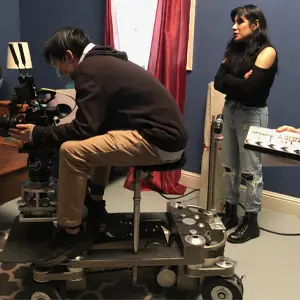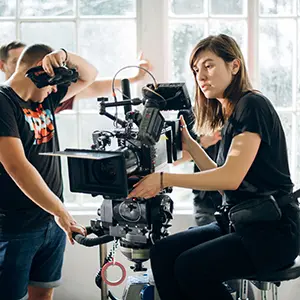Motion Pictures & Television (MFA)
Motion Pictures & Television (MFA)
The School of Motion Pictures & Television’s MFA program offers in-depth, advanced training in the various areas of film and television production. Depending on the area of specialization, the MFA program culminates in a thesis film or professional reel/portfolio. Areas of study include directing, producing, cinematography, editing, production design, and screenwriting. Students are prepared to compete for work in the industry or to teach, as the MFA is a terminal degree.
AA BFA MA CERTMaster of Fine Arts (MFA) Degree
Available Online
Major Classes









Unit Requirements
| Major Coursework | Units |
|---|---|
| Major Coursework | 30 |
| Directed Study | 18 |
| Electives | 6 |
| Graduate Liberal Arts | 9 |
| Total | 63 |
Degree Requirements
MFA MOTION PICTURES & TELEVISION DEGREE REQUIREMENTS
- Successful completion of Final Thesis Project.
- Minimum grade of C in all required 63 units.
- Minimum 2.0 cumulative GPA and the following Academic Study requirements:
1 Art Historical Awareness & Aesthetic Sensitivity course
1 Cross Cultural Understanding course
1 Major Designated Graduate Liberal Arts course
Additional Information

Program Learning Outcomes
Graduate students will meet the following student performance criteria:
Editing
- Demonstrate advanced– level achievement in editing through both thesis films and various other projects
- Demonstrate proficiency in post-production technology and techniques
- Effectively showcase work in an industry-standard demo reel and website
- Collaborate effectively with multi-disciplinary teams
Screenwriting
- Write shorts that are of sufficient quality to be approved for thesis production (Final Review only)
- Deliver fully-developed outlines and scripts that adhere to principles of a story structure
- Create 3-dimensional characters that drive the story
- Write dialogue driven by subtext
Cinematography
- Demonstrate advanced-level achievement in cinematography through thesis films and various other projects (Final Review only)
- Work effectively with various cameras, lenses and accessories
- Design and execute creative lighting schemes
- Effectively manage a scene for coverage
- Apply principles of composition and camera movements to enhance the story
- Collaborate effectively with grip, camera, and electric teams
- Effectively showcase work in an industry-standard demo reel and website
Directing
- Propose a story that is marketable and/or appealing to a general audience for development into a thesis film (Midpoint Review only)
- Demonstrate advanced-level achievement in directing through completion of an approved thesis project (Final Review only)
- Guide a crew in preproduction, production, and postproduction to execute effective choices that serve the story
- Elicit engaging and believable performances from actors
- Direct a thesis film that showcases their skills (approved first cut must include a temp dub)
- Collaborate effectively with multi-disciplinary teams
Producing
- Demonstrate advanced-level achievement by producing two or more thesis films (Final Review only)
- Effectively showcase work in an industry-standard demo reel or website
- Collaborate effectively with multi-disciplinary teams
Production Design
- Design the look of at least two thesis films based on the director’s vision, including: choosing locations, creating settings, selecting props, and dressing sets. (Final Review only)
- Communicate design concepts through basic drawing skills and visual presentations
- Effectively showcase work in an industry-standard demo reel and website
- Collaborate effectively with multi-disciplinary teams
Academy of Art University Learning Outcomes
Graduates of the Academy of Art University will demonstrate the ability to:
- Produce a body of work suitable for seeking professional opportunities in their chosen field of art and design.
- Solve creative problems within their field of art and design, including research and synthesis of technical, aesthetic, and conceptual knowledge.
- Communicate their ideas professionally and connect with their intended audience using visual, oral, and written presentation skills relevant to their field.
- Execute technical, aesthetic, and conceptual decisions based on an understanding of art and design principles.
- Evaluate work in their field, including their own work, using professional terminology.
- Recognize the influence of major cultural and aesthetic trends, both historical and contemporary, on art and design products.
- Learn the professional skills and behaviors necessary to compete in the global marketplace for art and design.
- Engage with a variety of communities beyond the classroom through internship opportunities, study abroad programs, athletics, student interest clubs as well as collaborative, civic and pro bono projects.
*Semester plans are subject to change at any time. Semester breakdowns displayed are suggested and additional options are available to help customize your educational experience. Speak to an admissions or student services representative for more information. Please see our catalog for more details at: https://catalog.academyart.edu